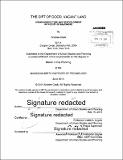The gift of good, vacant land : urban agriculture and redevelopment in the city of Baltimore
Author(s)
Cook, Andrew (Andrew John)
DownloadFull printable version (2.189Mb)
Other Contributors
Massachusetts Institute of Technology. Department of Urban Studies and Planning.
Advisor
Judith A. Layzer.
Terms of use
Metadata
Show full item recordAbstract
Urban agriculture in US cities has historically been treated as an interim land use, deemed only appropriate when real estate markets do not support the development of vacant land. However, urban agriculture in the 21st century has emerged in an era when cities have begun to embrace sustainability as a guiding principle, creating a window of opportunity for urban agriculture to become a more permanent aspect of city life. Additionally, this era of urban agriculture has also seen the emergence of commercial urban farms that seek to engage local economies in a way not seen in prior iterations of the practice. This has allowed urban agriculture an entry into the realm of economic development, perhaps the most significant driver of city growth. Because of these two factors, cities have begun incorporating urban agriculture into their land use planning efforts. However, many still treat it as a temporary land use. This is the case in Baltimore City, where two programs have sought to encourage urban agriculture as a temporary use on city-owned land: Adopt-A-Lot and the Homegrown Baltimore Land Lease Initiative. These programs have supported a blossoming of new farms and gardens, which has in turn led to the articulation of three types of urban farm: commercial farms, community farms, and demonstration farms. All types contribute to sustainable development in different ways, but by limiting the land tenure offered through these programs to short term leases and license agreements, the city is hobbling their ability to be truly sustainable, economically, environmentally, or socially. The city is doing this out of a bias towards traditional development over sustainable development. In this essay, I argue that treating urban agriculture as a permanent land use is the only way to make it an effective tool for sustainable development. In order to do this, the city of Baltimore needs to zone for urban agriculture, increase opportunities for farms in city parks, and establish processes for transferring ownership of vacant land from the city to urban farms.
Description
Thesis: M.C.P., Massachusetts Institute of Technology, Department of Urban Studies and Planning, 2014. Cataloged from PDF version of thesis. Includes bibliographical references (pages 53-56).
Date issued
2014Department
Massachusetts Institute of Technology. Department of Urban Studies and PlanningPublisher
Massachusetts Institute of Technology
Keywords
Urban Studies and Planning.